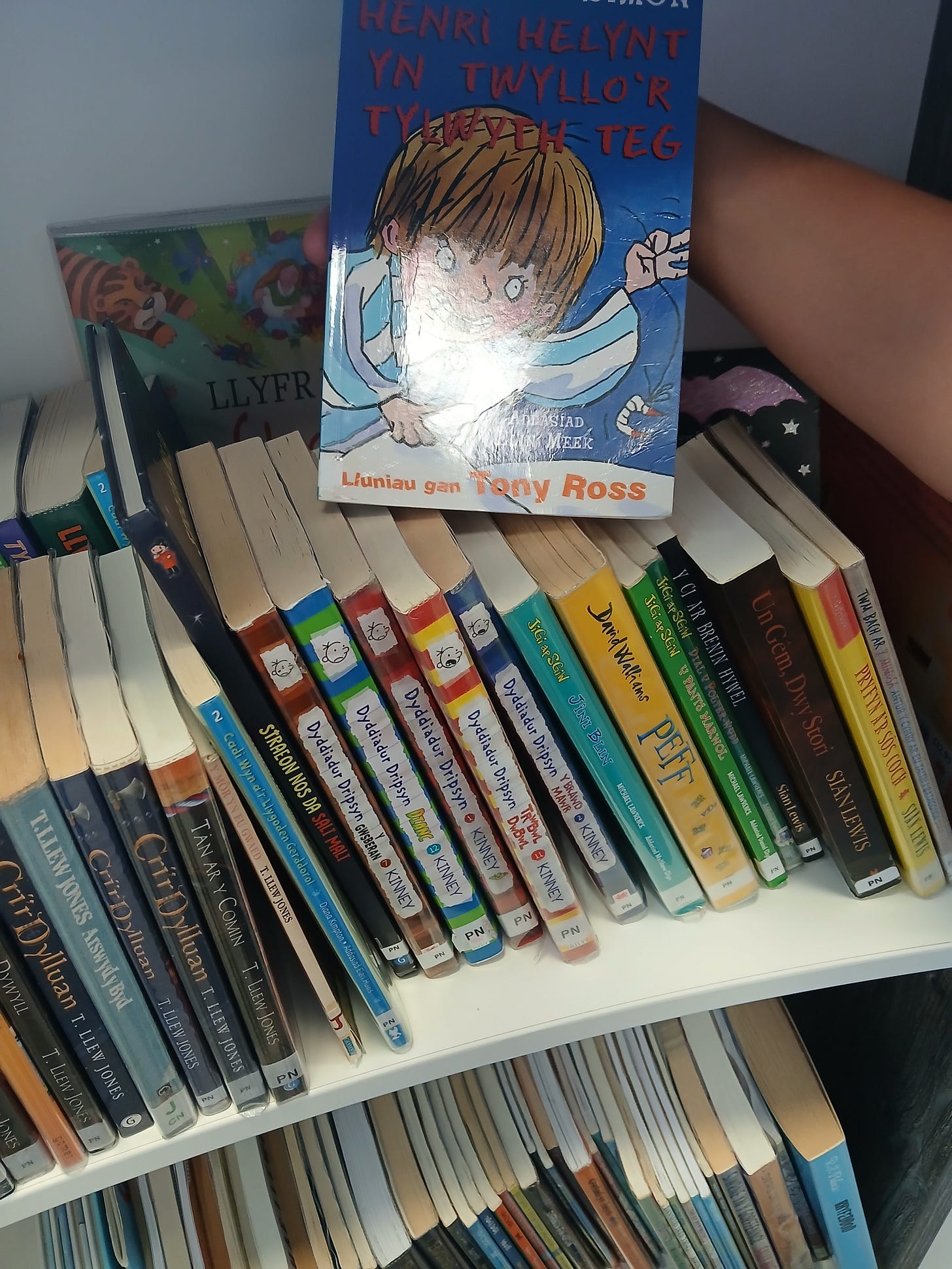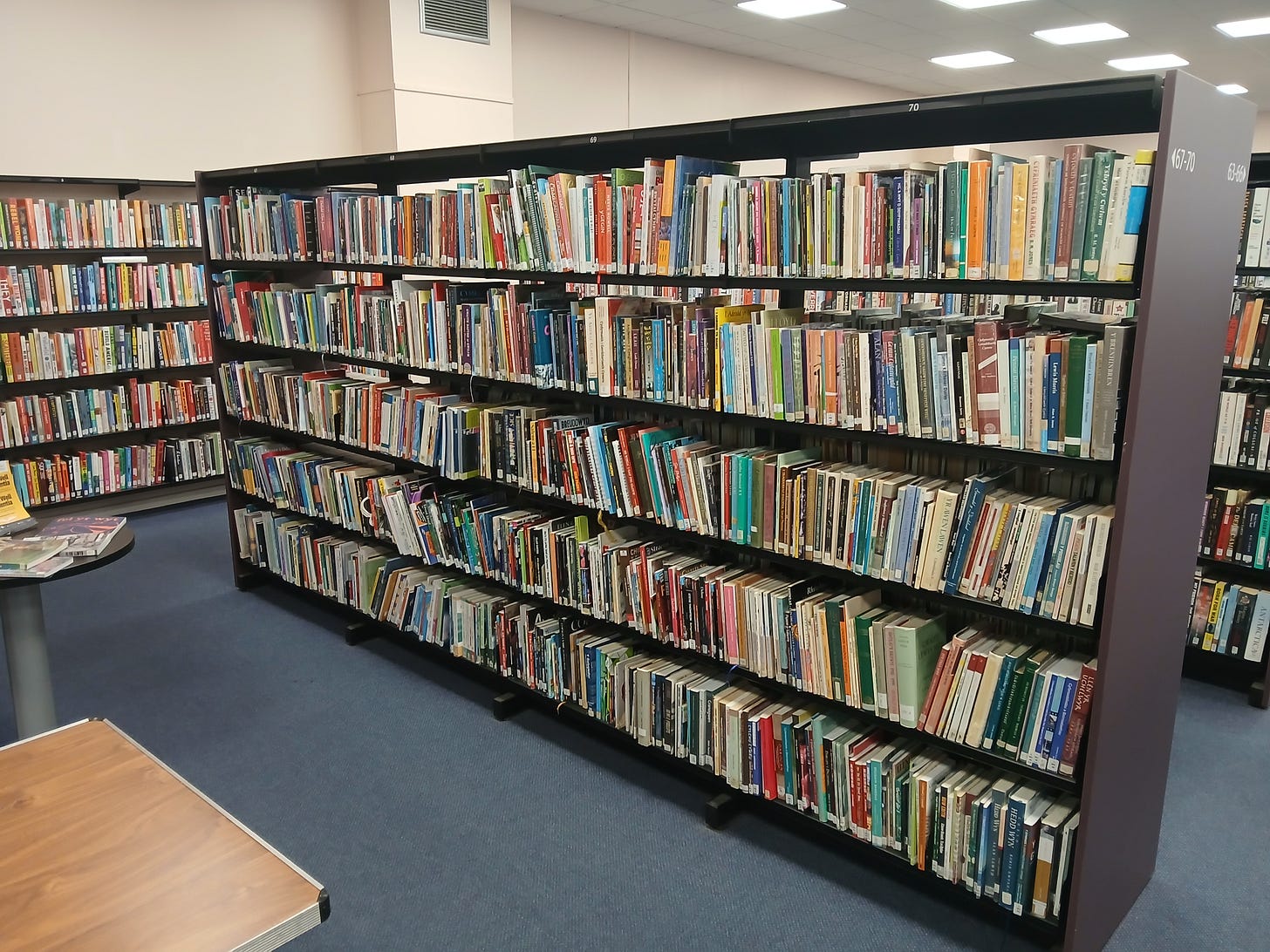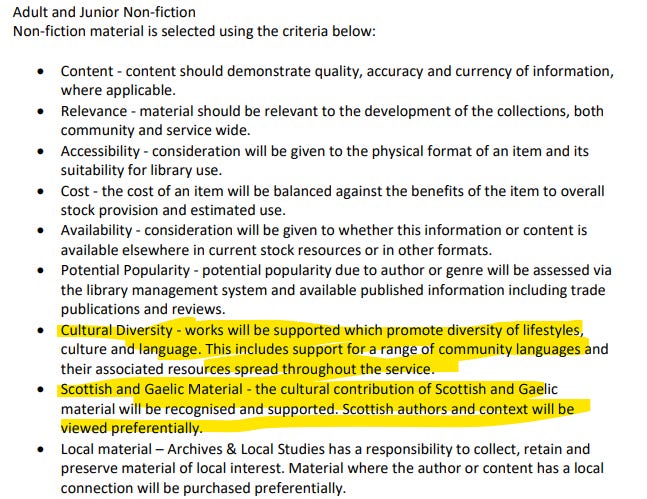Minority language books in Wales
In which I take a family holiday in Wales and admire their stewardship of indigenous languages
Scotland isn’t the only nation of the British Isles to have a substantial minority of minority language speakers.
In Wales 602,388 people reported in the 2021 census that they could speak or read Welsh, that is equivalent to 19.96% of the population. This is lower than the proportion of Scots speakers in Scotland (32.86%) but in the same ballpark.
Whereas we have seen that only 0.05% of books stocked in Scottish libraries are written in Scots, in Wales the collections of Welsh language books make up a substantial proportion of the total mass of books.
Carmarthenshire
The other week I went on holiday to Carmarthenshire, and at one point had to be rescued by the coastguard, it was quite traumatic and I need to tell someone all about it.
But the local village library had a decent collection of Welsh books. The Welsh adult fiction section amounted to five shelves each holding about sixty books for a total of 250 on display, and in the children’s section, there were about a thousand Welsh books on display.
A wee look at the regional Spydus library catalogue systems brings us some hard numbers.
Total
all languages Added this month Total Welsh Added this month
Burry Port 18,846 313 5,012 19
Carmarthen 86,403 603 8,945 36
Tenby 8,910 36 731 2 As proportions we can calculate that about 12.87% of titles in stock are written in Welsh, and about 5.99% of recent acquisitions were in Welsh.
We might imagine that this is what libraries look like when they treat minority languages with respect rather than oppression.
Whilst Carmarthenshire has about 13% of titles in Welsh, across the all the library services of Wales the figure is around 7%. This is significantly less than the proportion of Welsh speakers. But still more than a hundred times better then the proportion of Scots books in Scottish public libraries.
While I went exploring the grown-up book section of Carmarthen library, I left my son browsing the children’s section.
He was quite impressed by the breadth of the range of translations of English language children’s books - half a dozen Wimpy Kids books (Dyddiadur Dripsyn) and some David Walliams translations - these translation are also available in Scots. There were also several Horrid Henry books (Henri Helynt) - I’m reasonably sure there aren’t Scots Horrid Henry translations at the moment.
There was also a good number of original childrens books in Welsh, its not all translations. I reckon more than half were original works.
Policy
The proportions of Welsh books in Welsh public libraries didn’t happen organically.
I spoke to a senior librarian at one of the libraries who explained that they have specialist suppliers who send through the Welsh books separately to the usual suppliers of English-language books.
For most library services in the UK, two suppliers, Askews and Holts, and Peters supply English language books. I guess that because they buy in bulk for thousands of UK libraries they get good discounts for English books from English-language publishers.
Its not a case of Welsh libraries pleading with these suppliers to ship Welsh books to them.
Welsh language books are supplied by the Books Council of Wales, its a national charity established in 1961, with a staff of 40 people. They would be acquiring smaller quantities of books, there’s less of a discount, different profit margins. They receive hefty funding from Creative Wales and directly from various Welsh education departments.
There are also a handful of Welsh government departments dedicated to the promotion of the Welsh language. About a quart of schools in Wales are Welsh-medium, they teach in Welsh, have Welsh textbooks for maths, geography, biology etc. (all this for a smaller proportion of speakers than Scots)
The public library stocking policies also have firm targets for the proportion of Welsh language book acquisitions.
The Future
Is the Welsh public library system a model for how Scottish public libraries could be in the future if they didn’t oppress the Scots language so much?
Is there a middle ground between oppression and treating minoritised languages with equal respect?
Can we imagine the library services of Wales and Scotland competing against each other be most representative of the indigenous languages?
North Lanarkshire
As I’m writing this, North Lanarkshire libraries are reviewing their stock management policy. There’s no explicit mention of Scots, despite 30.8% of people in the council area reporting in the census that they consider themselves able to read Scots, that’s 102,036 people aged 3 and over who are being excluded.
The closest they get to acknowledging the Scots language is in the non-fiction selection criteria.
The absence of any explicit mention of Scots and lack of language awareness in the fiction selection criteria perhaps explains why only 82 titles out of the collection of over 142,000 are books written in Scots. This 0.05% Scots stocking level seems insufficient for the one in three Scots readers in their community.
In the last six months just two Scots language titles have been acquired in North Lanarkshire libraries, compared to over 5,627 English language titles.
In some respects its odd that Scots, Scottish and Gaelic material has to have some kind of cultural contribution, when English writers don’t.






